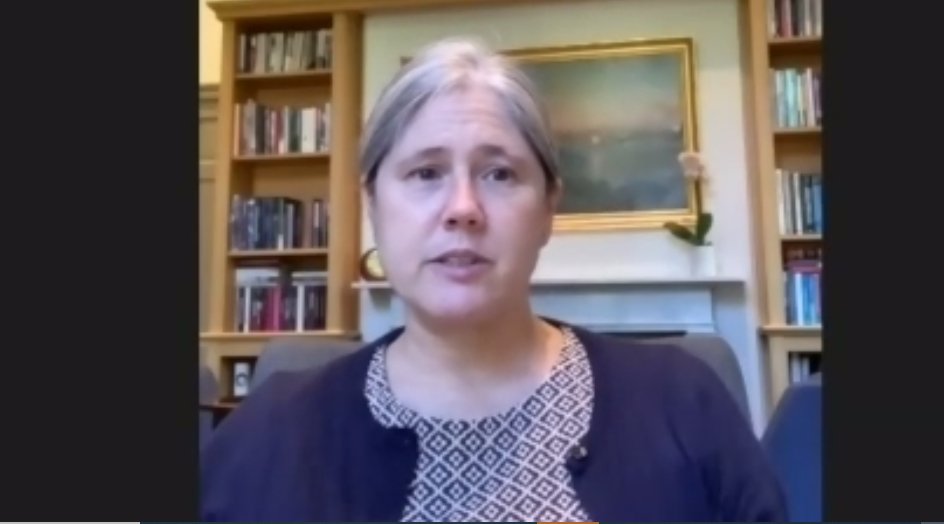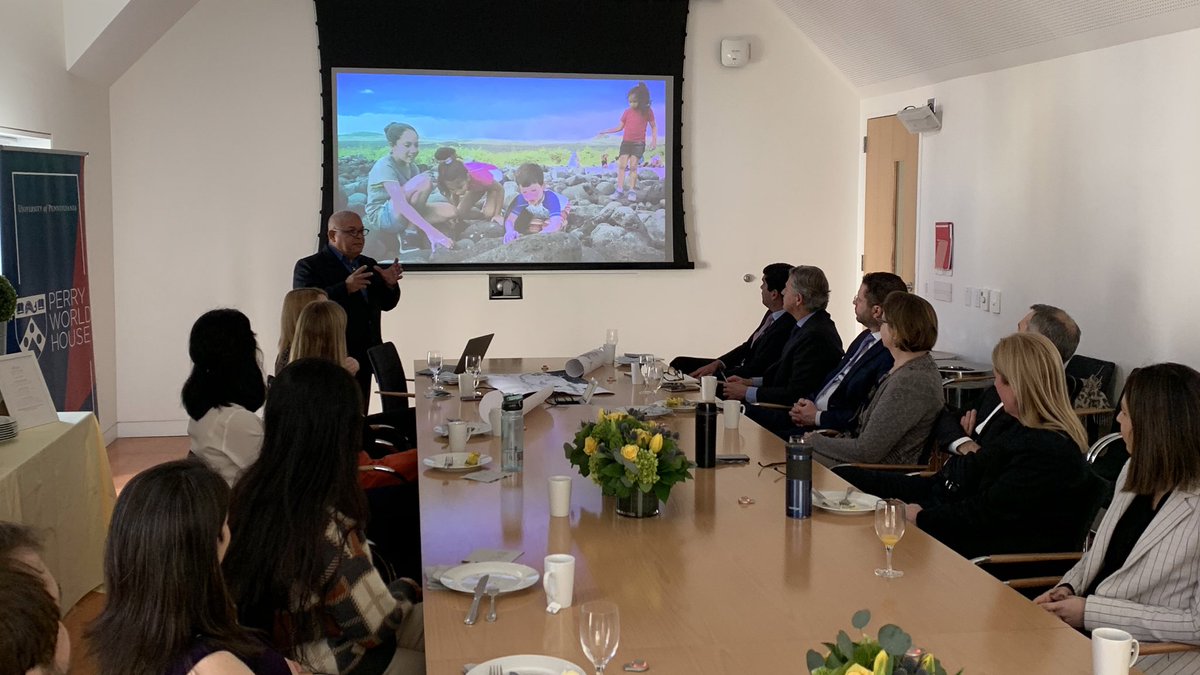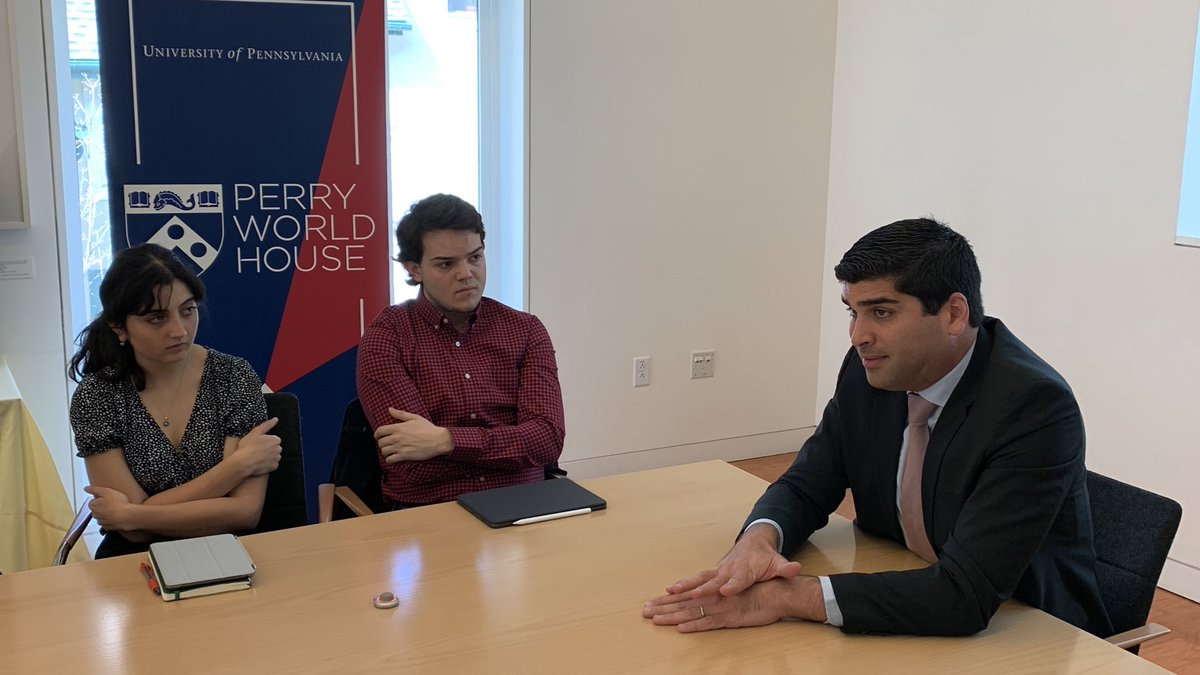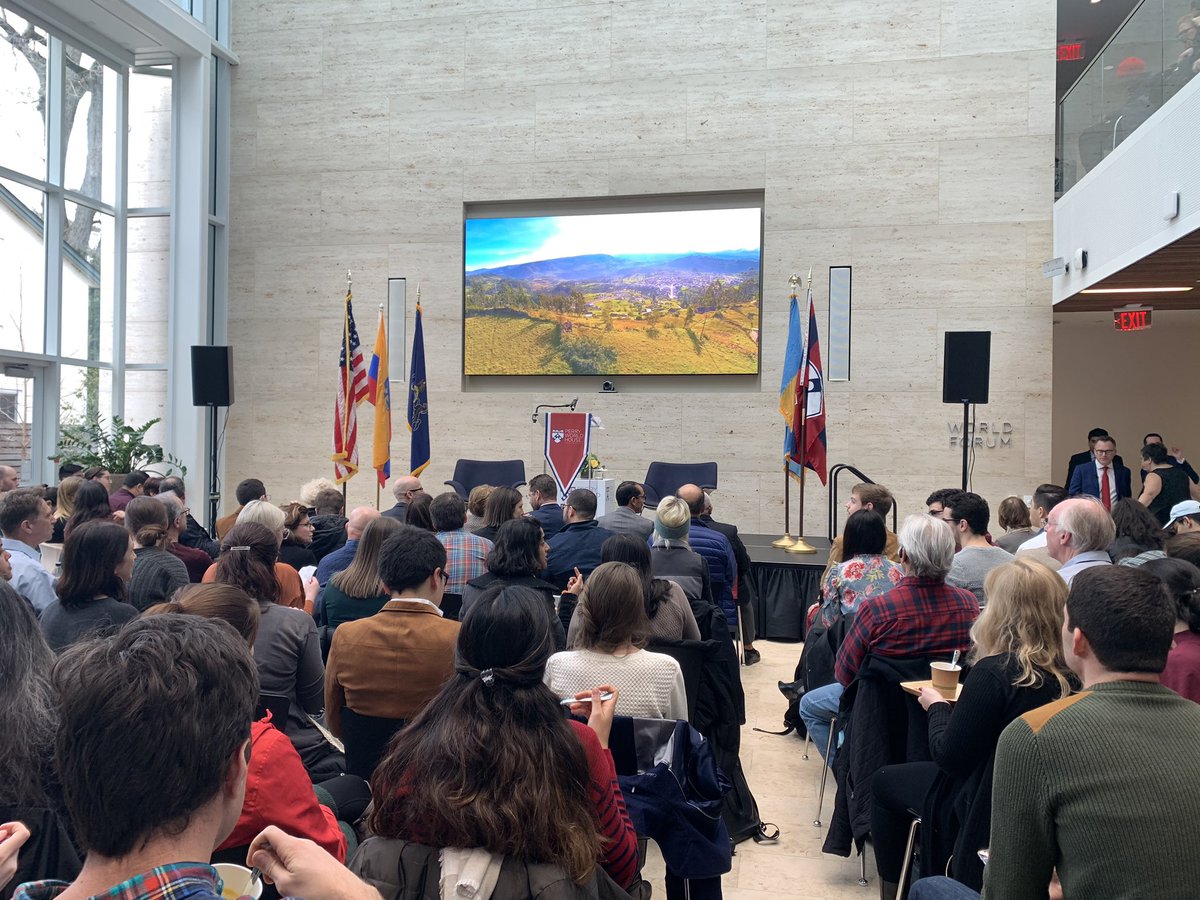
PWH Director @mchorowitz welcomes our in-person and virtual audiences to @perryworldhouse for today’s conversation with @MaEllenSirleaf. Follow this thread for updates🧵 

“Few have better insights on pandemic response and preparedness through her leadership of Liberia through the Ebola crisis,” says @PennNursingDean, introducing this event. 

“Penn’s work has touched the shores of West Africa,” says @MaEllenSirleaf. “I urge the professors here to keep @Penn the open house you are to train those from distant lands to go back and serve their countries.” 

“This year we are drawing close to our deadline for the #SDGs in 2030, and we are not on target to achieve those goals, most of all reducing poverty. Much has happened in recent years to disrupt that progress.” 

“Take stock of what’s happening in your world today. It’s a world shifting from cooperation. Have you heard the news about nationalism, protectionism, isolationism? Are you ready to accept others? Or will their gender, color of their skin, or choice of worship stop that?” 

“We never know when the unexpected will come. COVID-19 has spread to every corner of the world, killing millions. It reminds us that whatever we do, whoever we are in this world, we are connected, we have an entwined chain of global existence.” 

“Working with @TheIndPanel, we’ve learned that what begun as a localized virus spread to other countries which were unprepared. Even the richest countries were unprepared. COVID has pushed millions back into extreme poverty, with a disproportionate impact on women and girls.” 

“Scientists and researchers have done their job in producing vaccines, but now we face the issue of vaccine equity. When a disease is as widespread as this, affecting people with no means to respond, nobody is safe until everyone is safe.” 

“We need technological transfers to the countries of the Global South so they can manufacture vaccines themselves and get them out to their populations. We need resilient global health systems - that’s the real answer. The vaccine cannot provide sustainability in healthcare.” 

“Think also about gender equity. In 1985, the world adopted the Beijing Declaration platform for action, to put women in 30% of leadership around the world. 30 plus years on, where are we? We have 27 women who’ve served as heads of state and govt.” 

“The global average of women in parliament is only 27%. I’m throwing statistics around and I can’t tell you they’re fully reliable, because they come from different sources in different countries. We can’t say how women have progressed over time. We need to dig into that data.” 

“I’ll start with my own story. I married young and became a young mother, but was able to study abroad in the US. When I returned home I became involved politically, which led to imprisonments and exile from home several times. But difficulties have opportunities too.” 

“I was elected President - the first democratically elected female head of state in Africa - and served two terms as the constitution demands, and I oversaw the peaceful transition of power to my successor.” 
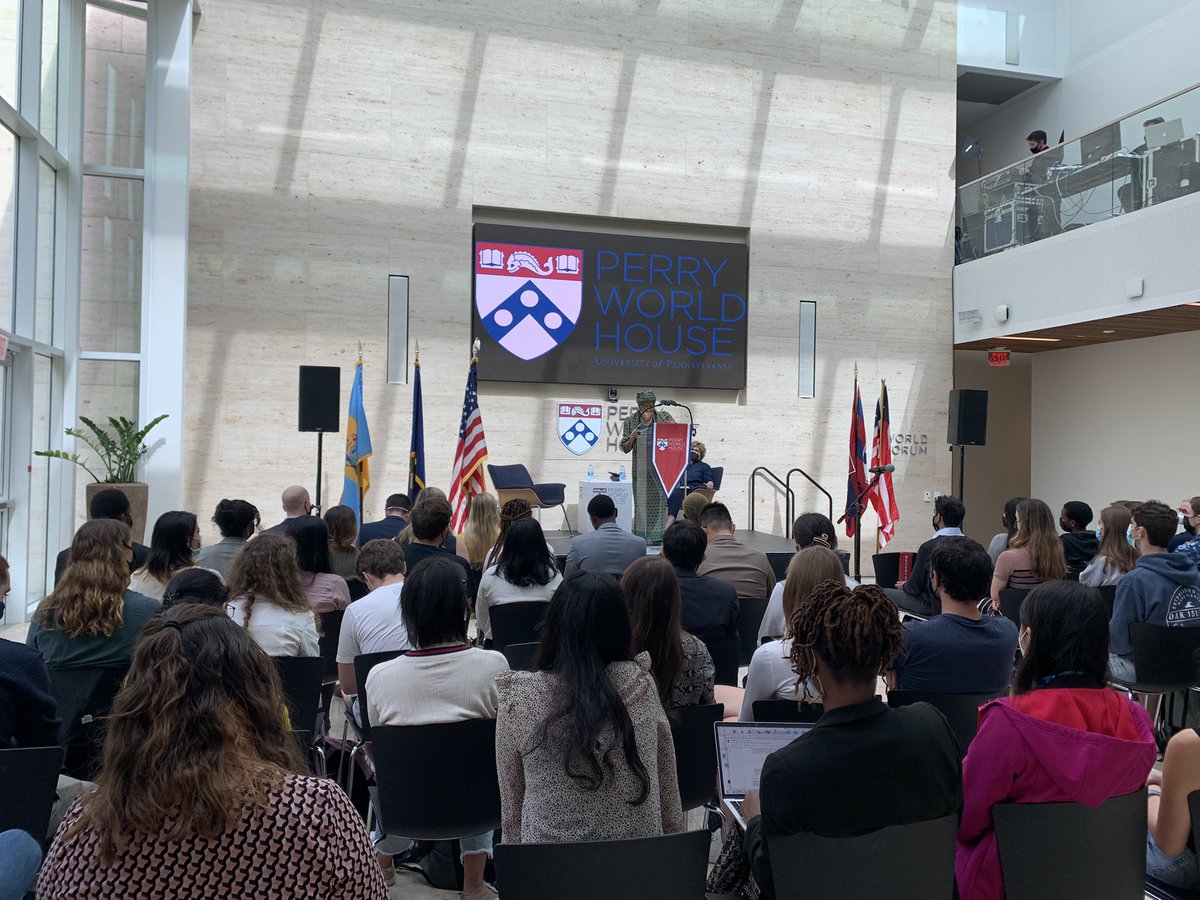
“There are so many women I admire. Eleanor Roosevelt, Margaret Thatcher, and Angela Merkel. As the world retreated from multilateralism and cooperation, she stood with migrants coming to Europe, offering to take and accommodate a million at great expense to her popularity.” 

“We also have Winnie Mandela, who led the charge while Nelson was imprisoned. Today we look for new heroes, and we have some of them already. If you look at social media - I do Twitter, but not Facebook! - you’ll see Ngozi Okonjo-Iweala is the new head of @wto.” 

“Equity for women is still a long way off. What we need to do is to see that we bring justice. All of the leaders I’ve talked about have not only led with integrity, they also had the common sense and empathy to reach out to others.” 

“You are the next generation. All that we’ve talked about will be your responsibility. You will guide the destiny of the world. What you learn here will help, but after you get there, how will you use the talent you got here? How will you position yourself towards a goal?” 

“I’m now approaching my 83rd birthday. We must pass the torch on to you, young people, to have courage unwavering to make the world a better place, with equity for everyone.” 

“How does Africa see the West as it throws away vaccines that could be used elsewhere? Is this a moment of some breaking of relations between us and you?” asks @deborahamos to start our moderated conversation. 

“This is a struggle between the rich and poor, every country has this internally too. When the vaccine reaches our country, it will go to the wealthiest first; that happened here too.” 

“We don’t think less of the world, it doesn’t undermine long years of partnership. It’s a temporary reaction to grave inequities and injustice, and the demand is to fix it.” 

“Africa has fared a little better in the pandemic, perhaps because of Ebola. We emphasized cooperation, we saw that giving responsibility to local healthcare workers worked. So when COVID hit it was a question of reactivating those community workers and getting them to work.” 

“There’s now a major program of the African Union that’s trained 2M healthcare workers to prepare for the next pandemic. But the same hesitancy that exists here - among the educated and rich who felt it wouldn’t happen to them - meant action was not taken til it affected them.” 

“We need to handle the IP issue to allow manufacturing locally. We now have an African Center for Disease Control, which has been able to achieve credibility with the west and mobilize our resources to purchase vaccines we can, but also get surplus from wealthier countries.” 

Who is vaccine hesitant in Africa and why? “The ones who die from COVID-19 - it’s true. The President of Tanzania unfortunately passed, and he didn’t believe in the virus. He had a movement to restrict vaccination, but he got infected and died. And that did change minds.” 

“You need to work with the public, getting them credible information so they can make the right decision. For those who distrust their own govt, for instance, they might assume the vaccine could harm them.” 

What kept President Sirleaf going in times of challenge? “I believed my country could be better and do more. We didn’t need to be continually left behind. We have to keep fighting and making it better. And we’re still doing that.” 
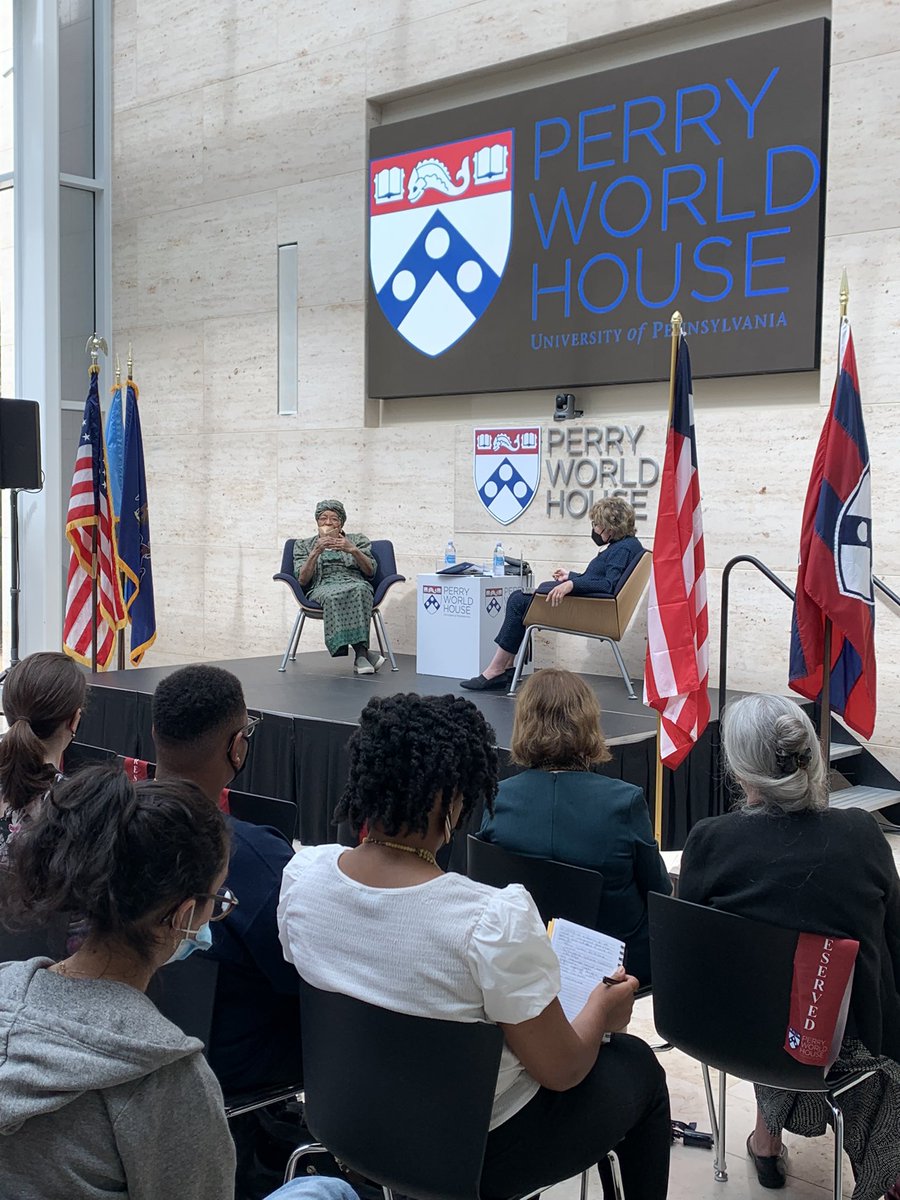
What techniques are helpful in getting people to listen on COVID which might work in gaining traction on climate change?
“Leading by example. I think leaders getting vaccinated in public, for everyone to see, makes a difference - that did not happen here. Leaders setting an example convinces others that this is the right thing to do.” 

Our next audience question asks about President Sirleaf’s stance on feminism, and if Africa is prepared for the next pandemic when vaccination levels for COVID-19?
“I prove I’m a feminist by what I do and what I say,” says President Sirleaf. “We have serious infrastructure constraints in Africa, especially with getting the vaccine to rural areas. Our job is big. Fortunately, rural areas have not been hit as badly by the virus.” 

Is the digital divide closing in Liberia? What’s the state of internet access in 2021? “Our country and most countries live by the internet. It’s important that knowledge is conveyed, but when we rely on Google for everything, is that information always based on proper evidence?” 

“It’s a resource we use, but it also has its negative effects. Everyone has the right to info, but we’ve reached a place where we may need some regulation on social media particularly.” 

We have a lot of STEM talent on the African continent, but what hinders innovation? “Our innovators are here, not there. They come here and they stay here, so we lose them.” 

“The question is how we get them to stay, because their arguments are legitimate - they want better education and health services for their children. But we can’t get those unless they come home and build it. Some countries, like Ghana, have built programs to bring people home.” 

How do we overcome cultural barriers that prevent women being in positions of power? “We have to continue to challenge the stereotype that women’s only role is to take care of home and children. We need to look at the Scandinavian countries and the quota systems they have used.” 

“But the pace is too slow. We are a century away from gender equity at the current pace. Can you imagine the number one democracy and power of the world has not been able to elect a woman president? That tells you how hard the battle is.” 

• • •
Missing some Tweet in this thread? You can try to
force a refresh


